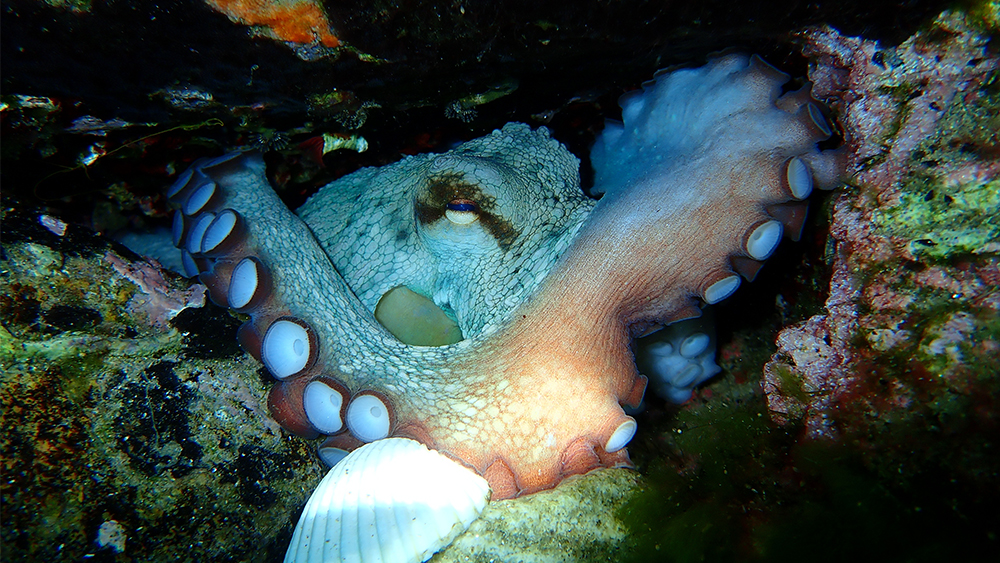Octopi are incredible and intelligent creatures—they are mesmerizing to observe and study. Some of octopi’s interesting features include the ability to change colors and blend in with surroundings, an ink defense that allows them to escape predators, a beak for a mouth, zero bones, and eight arms with suckers that allows them to grab, taste, and smell. Octopi are poikilotherms (cold-blooded). As a result, their brains are exposed and susceptible to changes in water temperature. A group of researchers studied Octopus bimaculoides to learn more about how change in water temperature affects the animal’s neural function.1
The authors of the study published their report in Cell last month. The scientists chose to study Octopus bimaculoides, commonly known as the two-spot octopus, because its genome was already fully sequenced. O. bimaculoides was studied in both the controlled environment of a lab, as well as the wild.1
According to the study, “Even modest acute temperature changes can result in death, brought about by a failure of the nervous system. Accordingly, molecular and physiological temperature acclimation is a key driver of organismal success.”1
The study showed O. bimaculoides recodes RNA on the fly, meaning RNA recodes for different proteins after leaving the nucleus of the cell. Recoding for different neuronal proteins allows the octopus to acclimate to varying water temperature. The RNA extracted from the stellate ganglia were analyzed from specimens acclimated to water temperatures varying from 55.4°F-75.2°F. The scientist performing the experiments said, “Our data show that temperature affects ~33% of all recoding sites and that editing changes occur within hours.”1 The recoding was more abundant in the specimens exposed to colder temperatures compared to warmer temperatures.1
Evolutionists agree that the “RNA editing appears to be a valuable tool for fine-tuning neurophysiological function in response to temperature.”1 However, the octopus’ adaptability via RNA remodeling challenges evolutionary theory. For an animal to adapt to its environment, evolution requires that animal’s DNA to mutate, giving the animal some new ability that helps them survive better. Mutations are permanent. According to evolutionary theory, over long periods of time and after several DNA mutations, a new animal arises that’s better adapted to its environment. But that is not how the octopus adapts to its environment. The changes in the created proteins are made by RNA, not DNA. These changes are not permanent and the DNA remains the same, as research scientist at ICR, Dr. Brian Thomas, wrote, “The DNA that specifies the editable RNA must maintain a very similar sequence over countless generations.”2 Furthermore, according to evolutionary theory, the adaptivity changes seen within O. bimaculoides should take eons. Yet, scientists observe the changes in protein production happen within hours. How RNA determines what protein to recode for remains unknown, however the scientists acknowledge that “the underlying mechanism is likely complex.”1
Evolutionists explain that certain cephalopods such as the O. bimaculoides “surrendered the benefits of a frequently mutating DNA genome in favor of RNA editing.”3 Creation scientists have a different explanation. The ornate complexity of RNA recoding observed in O. bimaculoides shows a unique design, intentionally given to them by Jesus, the Creator of the universe, to survive and thrive in their ocean home. “Leave it to the Creator to have equipped His marine creatures with the appropriate biological mechanisms to enable them to instantly obey His mandate: ‘Be fruitful, and multiply, and fill the waters in the seas,’” Dr. Thomas wrote.4
Dr. Randy Guliuzza, president of ICR, wrote in the March 2023 issue of Acts & Facts:
The anti-theistic power of Darwinism lies in one thing only—its anti-engineering assumptions. A classical Darwinian mechanism for adaptive change must use words that convey anti-design characteristics. Why? Well, if scientific literature can persuade people that organisms came about via a chaotic, purposeless process, then this fact would negate God directly creating them, and Darwinism would seem to make more causal sense.5
The more scientists learn about animals, the more Darwin’s theory of evolution falls apart, because evolutionists cannot explain the incredible engineering diversity and complexity observed in nature. The anomalous use of RNA editing found in O. bimaculoides is another example of nature defying evolutionary theory.
References
-
Birk, M. A. Temperature-dependent RNA Editing in Octopus Extensively Recodes the Neural Proteome. Cell 186, no. 12 (2023). Accessed June 22, 2023. https://doi.org/10.1016/j.cell.2023.05.0
04. - Thomas, B. Squid, Octopus Genomes Alter Themselves, Blocking Evolution. Creation Science Update. Posted on ICR.org July 3, 2018, accessed June 22, 2023.
- Cell Press. "How Octopuses, Squid, and Cuttlefish Defy Genetics' 'central Dogma'." Phys..org. April 6, 2023.
- Thomas, B. Octopus Cold Adaptation Surprises Scientists. Creation Science Update. Posted on ICR.org March 28, 2012, accessed June 22, 2023.
- Guliuzza, R. Mutation-Selection A Calamitous Creationist Concession. Acts & Facts, March 1, 2023.




















